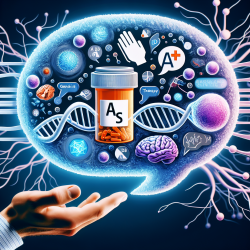Introduction
The recent study titled "From animal models to human disease: a genetic approach for personalized medicine in ALS" provides significant insights into the genetic underpinnings of Amyotrophic Lateral Sclerosis (ALS) and the potential for personalized medicine (PM) to improve therapeutic outcomes. This research highlights the genetic and phenotypic heterogeneity of ALS, emphasizing the necessity of tailored therapeutic strategies. For practitioners, understanding these genetic factors is crucial for improving patient care and advancing therapeutic interventions.
Key Findings and Implications for Practice
ALS is a complex neurodegenerative disease characterized by the degeneration of motor neurons, leading to progressive paralysis. The study identifies several gene mutations associated with ALS, such as SOD1, TDP-43, and C9ORF72, which account for a significant proportion of familial ALS cases. These genetic insights have paved the way for developing animal models that mimic human disease, providing a platform for testing potential therapies.
One of the critical outcomes of this research is the emphasis on personalized medicine. By understanding the specific genetic mutations present in ALS patients, practitioners can tailor treatment strategies to individual needs. This approach not only enhances therapeutic efficacy but also minimizes adverse effects, offering a more precise and effective treatment regimen.
Implementing Personalized Medicine in ALS Therapy
For practitioners, the implementation of personalized medicine in ALS therapy involves several steps:
- Genetic Screening: Conduct comprehensive genetic screening to identify specific mutations in ALS patients. This information is vital for tailoring treatment plans.
- Utilization of Biomarkers: Employ biomarkers to monitor disease progression and response to therapy. Biomarkers can provide real-time insights into the effectiveness of personalized treatment strategies.
- Gene Therapy: Explore gene therapy options such as antisense oligonucleotides and small interfering RNA to target specific genetic mutations. These therapies have shown promise in preclinical models and hold potential for clinical application.
- Collaborative Research: Encourage collaboration with geneticists and researchers to stay updated on the latest advancements in ALS genetics and personalized medicine.
Encouraging Further Research
While the current study provides a robust framework for personalized medicine in ALS, further research is essential to refine these approaches. Practitioners are encouraged to participate in clinical trials and contribute to the growing body of knowledge in ALS genetics. By doing so, they can help bridge the gap between research and clinical practice, ultimately improving patient outcomes.
Conclusion
The integration of genetic insights into ALS therapy represents a significant advancement in the field of personalized medicine. By tailoring treatments to the genetic profile of each patient, practitioners can enhance therapeutic efficacy and improve quality of life for individuals with ALS. As the field continues to evolve, ongoing research and collaboration will be key to unlocking the full potential of personalized medicine in ALS.
To read the original research paper, please follow this link: From animal models to human disease: a genetic approach for personalized medicine in ALS.










